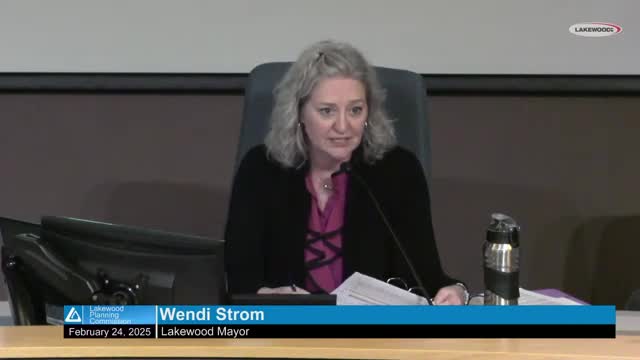Lakewood council restores fee-in-lieu option, exempts fully affordable projects and requires transparency after months of debate
Get AI-powered insights, summaries, and transcripts
Subscribe
Summary
After weeks of public comment and internal amendments, the Lakewood City Council adopted an emergency ordinance revising park and open-space dedication rules. The ordinance restores a fee-in-lieu option, creates a one-year review, exempts 100% affordable projects, and establishes a limited appeal path when a project pays 100% fee in lieu.
Lakewood Mayor Wendy Strom and the City Council adopted an emergency ordinance on Feb. 24 revising Chapter 14.16 of the Lakewood Municipal Code to restore the city’s fee-in-lieu option for park and open-space dedication, exempt fully affordable residential developments, require publication of the rationale when staff accepts fees instead of land, and set up a limited appeal process for projects that pay 100% fee in lieu. The ordinance passed on third reading by an 8-0 vote.
The ordinance replaces the version the council adopted in December and was the focus of an extended public hearing and robust debate at the Feb. 24 regular meeting. The measure restores the city’s prior process so developers can pay a fee in lieu of dedicating land, adds an explicit annual review of the fee schedule, and includes language to encourage land dedication where practicable.
The issue drew more than 30 in-person speakers and more than 150 written comments on Lakewood Speaks, with arguments split between residents and conservation advocates urging land dedication and developers and housing advocates warning that strict land-dedication requirements would stall affordable housing.
Kathy Kettner, a Ward 1 resident and a lead petitioner for the Save Open Space effort, told the council that the initiative arose from years of concern about projects built without green space. “The Save Open Space Lakewood Green initiative was not simply the result of opposition to 1 project, but the result of years of neglect by city council,” Kettner said. She also said the ballot summary had been prepared by city staff and defended the petition’s clarity.
Representatives of affordable-housing and mission-driven developers argued the ordinance as originally drafted made many affordable projects financially infeasible. Andrea Burns, representing Urban Land Conservancy, said, “ULC supports the fee in lieu option and the exemption for affordable housing and we encourage city council members to fight to keep both provisions in the final ordinance.” Lucas Hagen, research and policy manager at the Neighborhood Development Collaborative, urged adoption of the revised ordinance to allow affordable projects to move forward.
Council debate produced several substantive changes before the final vote. The council approved a cleanup amendment to clarify that the exemption for affordable housing applies only to projects that are 100% affordable under the metrics set by Proposition 123. A separate amendment created a transparency and limited appeals process: the Community Resources director must prefer land dedication when practicable, publish the basis for any decision to accept fees instead of land, and allow a Board of Adjustment review when a proposed development pays 100% fee in lieu and a petition signed by nearby residents is filed within a defined timeframe. Council also removed a proposed 10-acre automatic council-review threshold during the discussion.
City staff and department directors participated in the session. Tracy Wheelan, the city’s Community Resources director, told the council the ordinance and related staff memo were posted on Lakewood Speaks and described the city’s equity and walkability analyses used to guide park decisions. Travis Parker, a department director, explained that the code ties satisfaction of dedication or fee requirements to planning milestones (final plat, final development plan, or site plan), not simply to a building permit, restoring the earlier workflow that applies to multi-family and subdivision proposals.
Council members also directed staff to provide an annual report on the ordinance’s implementation and agreed to a one-year “look back” after enactment to assess outcomes and any needed adjustments. Councilors debated the precise radius and petition thresholds for appeals and ultimately set the notice radius at 500 feet for the approved petition process. The council also clarified that small, buildable single-family lots already entitled under existing zoning would not be swept into new dedication requirements simply because an owner is rebuilding on the same lot.
The ordinance was adopted as an emergency measure on a final 8-0 vote. The meeting record shows multiple formal actions that evening: the consent agenda (which included an intergovernmental agreement, a $19,682,727 transfer to the stormwater enterprise fund to be used by Mile High Flood District for North Dry Gulch drainage improvements, an appointment to the budget and audit board, and other routine items) passed 8-0; Ordinance O-2025-8 (accepting a deed from the Mile High Flood District for 7650 West Second Avenue) passed 8-0; and Ordinance O-2025-7 (the park and open-space dedication ordinance as amended) passed 8-0.
The council’s actions return Lakewood to a dual pathway—land dedication where practicable, fee-in-lieu where appropriate—while explicitly protecting fully affordable housing projects from dedication requirements and creating additional transparency and a narrow review path for projects that propose to pay 100% fee in lieu. Supporters of land dedication said the changes do not fully meet their goals; supporters of the ordinance said the revisions will allow housing and permit processes to resume after the pause created by last year’s ordinance. The council instructed staff to post decisions and produce a one-year review to evaluate whether the ordinance achieved the intended balance.
